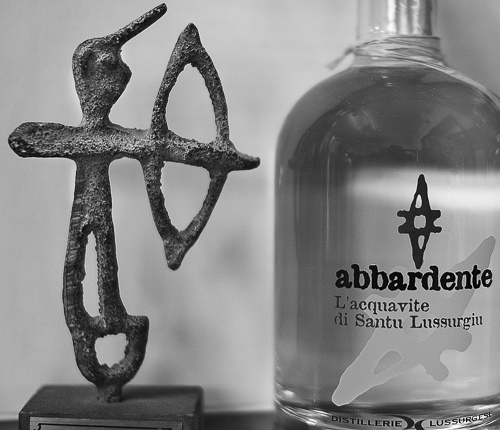Due to the mediocre quality of the local wine in this area, the locals have been making spirits called abbardente using merc (grapes which have been compressed having all their liquid parts removed) for centuries.
Carlo Pischi, after having worked as a mechanic for many years, participated with a bottle of abbardente at a fair called Vinitaly in Verona, winning first prize for best label, that is a stylized figure of a bronze age hunter marked directly on a clear bottle.
This first and unexpected win made Carlo leave his profession as a mechanic and, instead, resuming cultural and local traditions in Santu Lussurgiu.
In fact, driven by his desire to renew ties to ancient traditions of his village by drawing on local knowledge of making spirits obtained through hundreds of years of work, he called his distillery “Antique Distilleries of Lussurgiu”.
A distillery, on which Carlo would like to base his products, was founded in Santu Lussurgiu in 1838, but spirits known throughout Sardinia were produced by local housewives several centuries in advance. In the beginning of the 1900s, a certain professor Meloni started producing Sardinian cognac using more or less scientific methods. However, due to EU laws, the name of cognac is a reserved name only to be used by cognac producers living in the area with the same name in France.
The difference between aquavite and cognac is that is that the latter has to be stored in oak barrels for at least 3 years, while it is up to the distiller to decide how long the former should be stored.
Inside a display cabinet we could see a seal issued by the Sardinian Customs Office used to ensure that a French oak barrel, containing the precious aquavite, is stored for 3 years.
In the summer of 2010, more than 120 years after the production of the first Sardinian cognac, the sacred barrel will be opened and the liquid will be bottled and be put up for auction. The plan is to mark this event at a grand convention in order to celebrate that a typical Sardinian product has been resurrected by following ancient traditions.

